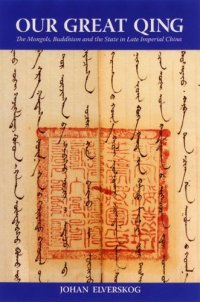
Ebook: Our Great Qing
Author: Johan Elverskog
- Genre: History
- Tags: Исторические дисциплины, История стран Азии и Африки, История Китая, Новая история Китая (династии Мин и Цин)
- Year: 2006
- Publisher: University of Hawaii Press
- Language: English
- pdf
In his investigation of Mongol society on the eve of the Manchu conquest, Elverskog reveals the distinctive political theory of decentralization that fostered the civil war among the Mongols. He explains how it was that the Manchu Great Enterprise was not to win over ''Mongolia'' but was instead to create a unified Mongol community of which the disparate preexisting communities would merely be component parts.To foster this change, Manchu rulers sought religious sanction ''from above'' through the cult of Chinggis Khan and with this mandate set about to restructure the cult itself and the Mongol aristocrats as members of a unified empire. As a result, the Mongol nobility came to see themselves as representing a single community that had been rescued by the gracious Manchu rulers during the civil wars of the early seventeenth century. A key element fostering this change was the Qing court’s promotion of Gelukpa orthodoxy, which not only transformed Mongol historical narratives and rituals but also displaced the earlier vernacular Mongolian Buddhism. Finally, Elverskog demonstrates how this eighteenth-century conception of a Mongol community, ruled by an aristocracy and nourished by a Buddhist emperor, gave way to a pan-Qing solidarity of all Buddhist peoples against Muslims and Christians and to local identities that united for the first time aristocrats with commoners in a new Mongol Buddhist identity on the eve of the twentieth century.
By providing an intellectual history of Mongol self-representations in late imperial China, Our Great Qing offers an insightful analysis of the principal changes that Mongolian concepts of community, rule, and religion underwent from 1500 to 1900 while offering new insights into Qing and Buddhist history. It will be essential reading for a range of different audiences, from those working specifically in Sino-Inner Asian history to those interested more broadly in the history of empires, their peripheries, and the role of religion in communal and state formations.